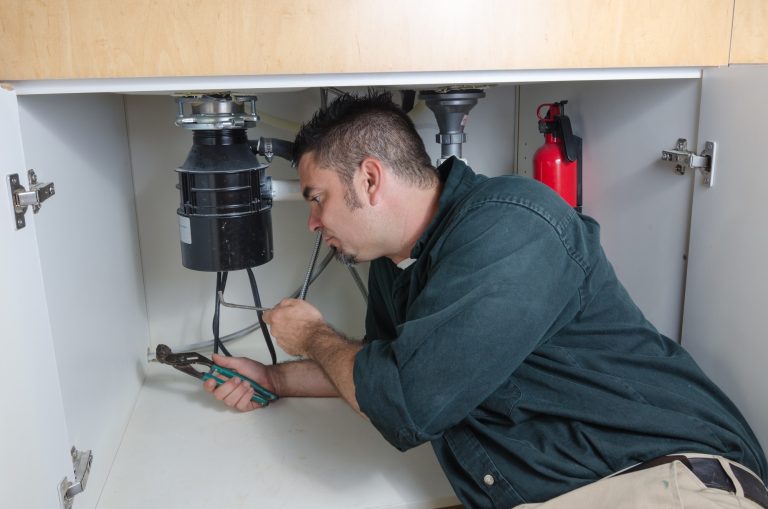
Call to fix garbage disposal quit working
A garbage disposal is a convenient appliance that helps manage kitchen waste efficiently. Nevertheless, it is prone to occasional malfunctions. This comprehensive guide will walk you through troubleshooting and fixing common problems like garbage disposal quit working, as well as tips for maintaining your garbage disposal to prevent future issues.
Understanding the Basics of a Garbage Disposal
To effectively troubleshoot issues, it’s important to understand the fundamental workings of a garbage disposal. This device, installed under the kitchen sink, grinds food waste into small particles that can be safely washed away into the sewer system. The disposal unit comprises various components, including the motor, grinding chamber, and impellers, which work together to pulverize food waste.
Common Reasons Why a Garbage Disposal Quit Working
When your garbage disposal quits working, several factors could be at play. Understanding these common issues can help you diagnose and fix the problem more efficiently.
1. Electrical Problems
One frequent cause for a garbage disposal to malfunction is electrical issues. Ensure the unit is securely plugged in. Occasionally, the problem might stem from a loose connection. Additionally, verify the status of the circuit breaker to see if it has tripped.
2. Clogged or Jammed Disposal
A jammed disposal is another frequent issue. Over time, certain food items can cause blockages. Common culprits include fibrous vegetables, bones, or large food particles. If the garbage disposal is jammed, it’s essential to address this issue promptly to avoid damaging the motor.
3. Overheating
The disposal can automatically shut off if it overheats, which acts as a protective measure. Overheating may happen if the appliance is used for prolonged periods or overloaded with food waste.
4. Mechanical Failures
Mechanical failures, such as a faulty motor or broken components within the disposal, can also cause it to stop working. These issues may require professional garbage disposal repair services.
Troubleshooting a Garbage Disposal That Quit Working
If your garbage disposal stops functioning, you can try these steps to diagnose and potentially resolve the problem:
Check for Electrical Issues
- Ensure the disposal is plugged in correctly.
- Look at the circuit breaker and reset it if it has been tripped.
- Locate and press the reset button, typically found on the underside of the unit.
Clear Any Jams
- Turn off the power to the disposal unit by unplugging it or switching off the circuit breaker.
- Use a flashlight to look inside the disposal for any visible blockages.
- Use a hex key or an Allen wrench to manually turn the impeller from the bottom of the unit. This action can help dislodge any jammed items.
- Use tools, not your hands, to remove objects from the disposal.
Address Overheating
- Allow the disposal to cool down if it has overheated.
- Press the reset button once the unit has cooled.
Inspect for Mechanical Failures
- If the disposal still doesn’t work, it might have a mechanical issue. In this case, contacting a professional for garbage disposal repair is advisable.
DIY Garbage Disposal Repair Tips
For those who are handy, some minor repairs can be done without professional assistance. Here are a few DIY tips for garbage disposal repair:
Replacing a Worn-Out Splash Guard
The splash guard prevents food particles from splashing out of the disposal. Over time, it can wear out and may need replacement. To replace it:
- Turn off the power to the disposal.
- Remove the old splash guard by pulling it out.
- Install the new splash guard according to the manufacturer’s instructions.
Fixing a Leaky Garbage Disposal
Leaks can occur at various points, such as the sink flange, dishwasher connection, or discharge drainpipe. To fix a leaky garbage disposal:
- Identify the source of the leak.
- Tighten any loose connections.
- Replace worn-out gaskets or seals as needed.
Preventative Maintenance for Your Garbage Disposal
To ensure your garbage disposal continues to function correctly and to avoid frequent waste disposal unit repair, follow these preventative maintenance tips:
Regular Cleaning
Regular cleaning helps prevent buildup and odors. Clean your disposal by:
- Running cold water and dish soap through it for a few minutes.
- Grinding ice cubes and citrus peels to remove debris and freshen the unit.
Avoiding Certain Foods
Some foods should never go into the disposal, including:
- Fibrous vegetables (e.g., celery, corn husks)
- Grease and fat
- Bones
- Starchy foods (e.g., potato peels)
Using the Disposal Properly
- Ensure cold water is running whenever the disposal is in operation.
- Feed food waste into the disposal gradually rather than all at once.
When to Call a Professional
While DIY solutions can address many issues, some situations require professional intervention. Call a professional if:
- The disposal doesn’t turn on despite troubleshooting.
- There are loud or unusual sounds, such as grinding or squealing.
- The disposal has frequent clogs or jams.
- There is persistent leakage.
Conclusion
A garbage disposal that quits working can be a significant inconvenience, but with the right knowledge, you can troubleshoot and fix many common issues. Regular maintenance and proper use can extend the life of your disposal and prevent problems from occurring. When in doubt, don’t hesitate to seek professional garbage disposal repair services to ensure your unit operates safely and efficiently.
By adhering to these tips, you can maintain your garbage disposal’s efficiency, reducing the need for waste disposal unit repair and keeping your kitchen running smoothly.